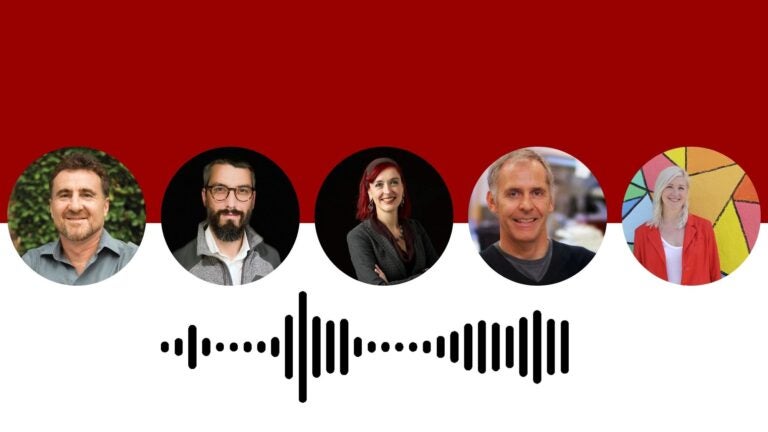
USC Dornsife scholars showcase their research and expertise on The Academic Minute
During “USC Dornsife Week” on The Academic Minute, Aug. 14 to 18, five distinguished scholars from USC Dornsife showcased their knowledge and cutting-edge research for a nationwide audience.
Their studies span diverse and captivating fields, including artificial intelligence and drug discovery, synapse mapping, tackling food insecurity, earthquake prediction, and effective communication on climate change.
In brief summaries of less than two minutes, each scholar provides a glimpse into groundbreaking work.
The Academic Minute is a daily program produced by Northeast Public Radio station WAMC and syndicated to public radio stations throughout the nation.
Monday: Can A.I. Cut the Cost of New Drugs?
Vsevolod “Seva” Katrich, associate professor of quantitative and computational biology and chemistry, discusses how recent advancements in computer modeling coupled with AI and extensive data resources are making drug discovery faster and more efficient in two ways. One method finds the right “key” for a “lock” by rapidly testing many virtual keys. The other uses AI to guess the right key based on what’s worked before.
Audio PlayerTranscript of this audioTuesday: Is the Seismic Crisis Over Now for Turkey?
Sylvain Barbot, associate professor of Earth sciences, delves into the seismic crisis that struck eastern Turkey on Feb. 6. His research reveals a concerning discovery: a section of the fault remains locked under immense pressure, raising fears of another devastating earthquake.
Audio PlayerTranscript of this audioWednesday: It’s Time to Ditch Climate Change Jargon
Wändi Bruine de Bruin, Provost Professor of Public Policy, Psychology And Behavioral Science, amplifies the urgent need to simplify climate change communication. Her research reveals that using complex jargon in discussions about climate change hinders understanding and alienates the very audience we seek to engage. Using everyday language, on the other hand, makes it easier to understand.
Audio PlayerTranscript of this audioThursday: Mapping Synapses and the Future of Memory Treatments
Donald Arnold, professor of biological sciences and biomedical engineering, and his team have made significant progress in understanding memory formation. He explains how, by genetically modifying neurons and observing them through a customized microscope, they were able to analyze synapse maps before and after memory formation. Their discoveries hold promise for advancing treatments for neuropsychiatric conditions.
Audio PlayerTranscript of this audioFriday: Uncovering the True Extent of Food Insecurity in the U.S.
Kayla de la Haye, associate professor of population and public health sciences, examined data that suggests that the current estimates of food insecurity may be underestimated by as much as one-third. She describes how her team found that surveying households more frequently than once a year can produce more accurate data. De la Haye recommends that the USDA and other agencies conduct surveys multiple times a year.
Audio PlayerTranscript of this audio